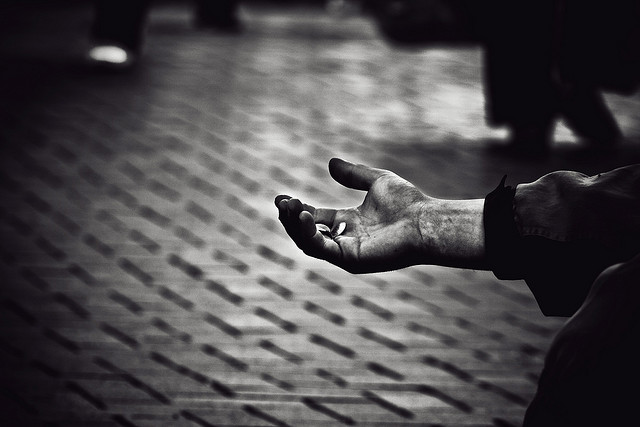
I had seen him walking along the overgrown grassy side of a rush-hour, four-lane road.
He was a grown man, but seemed to be wearing an ill-fitting football uniform. At first, I thought he was one of those dressed up characters advertising on the roadside for a local business, but I noticed that he was carrying his belongings in a large laundry bag.
I was busy. Traffic was thick. I didn’t think much about him except for his unusual clothing.
I was caught by surprise the next morning as I walked into a restaurant and found this same man in the same clothing standing at the counter ahead of me. He turned around and walked toward me like he knew me.
He announced: “I’m in bad need. You got some money? I need you to give me some money.”
It was Saturday and I was up early for a meeting with some fellow teachers. I carry cash in my wallet largely so that when someone is in need, I can help. That’s not always been the way for me in my life—there were times when I just didn’t have cash to carry around. There were other times when I was confused about whether it was a good thing to give cash to someone asking for it on the street.
Ultimately, I’ve reached a place where I can keep extra cash for such moments, and I’ve also decided that less judgment and more compassion are good for me and for others.
I felt my face flush as the whole place seemed to stop and watch what was about to transpire.
A woman with kind eyes was helping him order some breakfast. She watched as I opened my wallet. I pulled out the first bill I saw, a $5 bill and handed it to him. He seemed pleased, like a child, and like a child he did not miss that pulling out the $5 caused another $1 to edge out as well.
“Can I have that dollar, too?” I gave it to him.
At that point, a woman in professional attire was standing next to me. She took me by the arm. She was the manager and she looked anxious. I told her it was okay. That I was okay. That I didn’t mind. Really.
“But we cannot have people coming in and panhandling in the restaurant.” I reassured her that it was okay, that I didn’t mind. I had chosen to give him money. I could have said no. It was really okay.
The man returned to the woman who was helping him get his breakfast. I moved up in line and placed my order. The cashier hit buttons, and then just looked at me. “No charge.” I was caught by surprise again. The manager seemed to step in behind her from nowhere and mouthed almost silently: “Just trying to pay it forward, sir.”
While I waited for my food, an older woman came out and looked at what was going on. She charged at the man: “So what did you do with the bagel I bought for you a little while ago?”
It sounded more like an accusation than a question. She said it twice. He tried to answer, but she dismissed him with a hand. Whatever had moved her to “help him” a while earlier had been trumped by her own sense of righteousness and judgment.
I pondered what had happened all the way to my little group of teachers that was gathering there for a meeting, and all through the day, and for several days after that, until now.
Momentary belonging—this sense of connection—between people who (not one of us) knew each other. Each attempting some sort of humanity. And that most certainly includes the man who found it in himself to say: “I need help!” I was caught by the surprise of his boldness. Of his child-likeness.
I was caught by the woman with the kind eyes who was helping him buy food. I was caught by the manager who really didn’t know what to do and by the angry woman who needed to control how her help was received. I was caught by my own sense of calm and by the notion that the manager wanted to pay it forward to me.
Belonging and community can happen by accident. Even by accident, though, it strikes me that all belonging, all community, results from this power we have to attempt being human and humane between us. The opportunities can be chosen. They can be unexpected and catch us by surprise. Either way, we have this power to attempt humanity between us.
Sometimes we succeeded. Sometimes we fail. I suspect that for most of us, each attempt is at least a place from which we can learn to be better human beings. I’m pretty sure that the woman with the kind eyes that day was the sage among us.
Thank you, man in the unusual clothing. And woman with the kind eyes. And angry woman. And manager who wasn’t sure what to do. I found something of myself in each of you. I found some kind of belonging.
Author: Robert Patrick
Editor: Nicole Cameron
Image: Hamed Parham/Flickr





Read 0 comments and reply